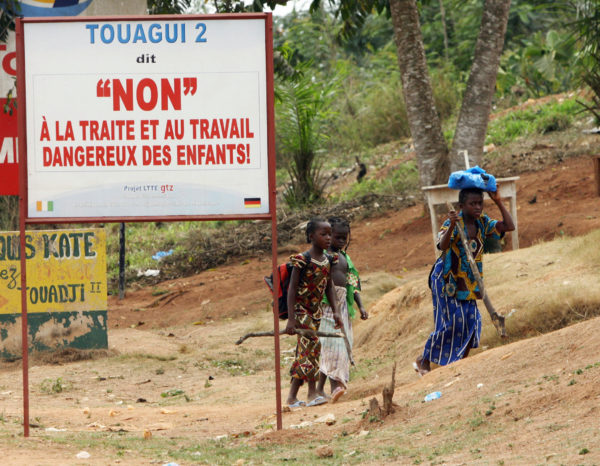Former child slaves who say they were trafficked to the Ivory Coast in order to work on cacao plantations that sold products to U.S. food giants can’t sue the American companies they claim perpetuated the slave trade business.
The Supreme Court ruled on June 17 that six citizens of Mali in West Africa can’t sue chocolate companies Nestle USA, Inc., and Cargill, Inc. The companies do not own or operate farms the grow cacao — the tree that produces the pods from which cocoa is made — in Ivory Coast, but they do buy from farms located there and provide those farms with technical and financial resources. Plaintiffs claimed they knowingly engaged in “aiding and abetting” human rights violations against workers.

Associate Justice Clarence Thomas delivered the opinion for the court, writing that the six plaintiffs, who filed the suit 15 years ago, can’t sue under the Alien Tort Statute (ATS) because the actions in question took place in Ivory Coast, not in the United States.
“Because respondents’ injuries occurred overseas and the only domestic conduct alleged by respondents was general corporate activity, the District Court dismissed the suit as an impermissible extraterritorial application of the ATS,” court documents say.
The ATS gives the federal courts jurisdiction to hear lawsuits filed by non-U.S. citizens for wrongful acts committed in violation of international law.
The case spotlighted major issues in the global cacao supply chain and its impact on West Africa, where 70 percent of the world’s cacao is grown, including by laborers as young as 5 years old, in deplorable and hazardous conditions tantamount to slavery. Amid growing international scrutiny and condemnation of the practice, this month 10 Ivorians were convicted of child trafficking in cacao plantation region and sentenced to 10 years in prison.
The former workers who filed the suit said they were between the ages of 12 and 14 when they were trafficked to the Ivory Coast and enslaved on cacao plantations there. They brought the suit using John Doe pseudonyms out of fear of violent reprisals from former traffickers, plantation owners and local cacao buyers.
According to the suit, workers were “forced to work on Ivorian cocoa farms for twelve to fourteen hours per day, at least six days per week. They were not paid and were given only scraps of food to eat. Respondents were beaten with whips and tree branches when their overseers felt that they were not working quickly enough. They were forced to sleep on dirt floors in small, locked shacks with other children, and were guarded by men with guns to prevent them from escaping.”
When workers did attempt to escape, they were severely punished, beaten and tortured.
“One Respondent, John Doe IV, tried to escape, and when the overseers caught him, they cut the bottoms of his feet and rubbed chili pepper into his wounds. He was also tied to a tree and beaten until his arm was permanently damaged. John Doe III witnessed small children who tried to escape being forced to drink urine. John Doe VI was severely beaten for working too slowly when he was sick and, like the other Respondents, his arms bear multiple scars from machete cuts he incurred while being forced to use the sharp tool to cut down and open cocoa pods,” the suit says.
A 2018 Department of Labor report found that 2.1 million children work on cacao farms in Ivory Coast and Ghana. But during arguments last December, questions were raised about whether or not the defendants were aware of the conditions at farms in the Ivory Coast.
Associate Justice Stephen Breyer said the defendants were “doing business” with people but weren’t running the farms.
“You don’t even allege that they actually knew about forced child labor,” Associate Justice Samuel Alito said of Nestle during oral arguments last fall. “After 15 years, is it too much to ask that you allege specifically that the … defendants who are before us here specifically knew that forced child labor was being used on the farms or farm cooperatives?”
The court ruled 8-1 for chocolate makers, with conservative Justice Alito the lone dissenter.


